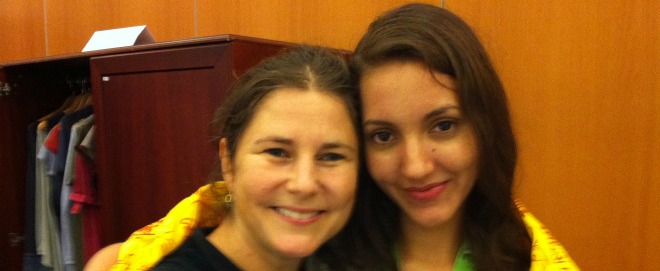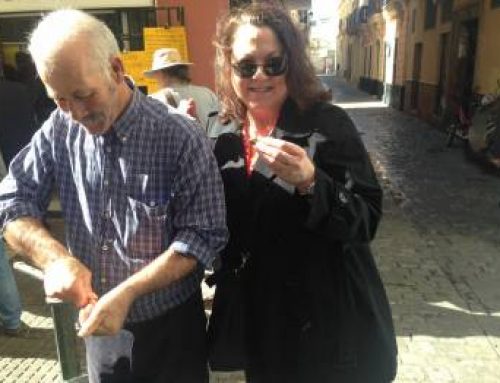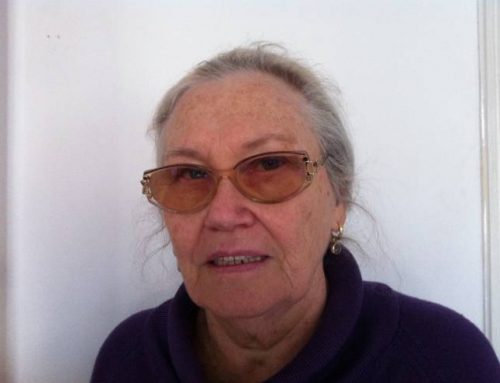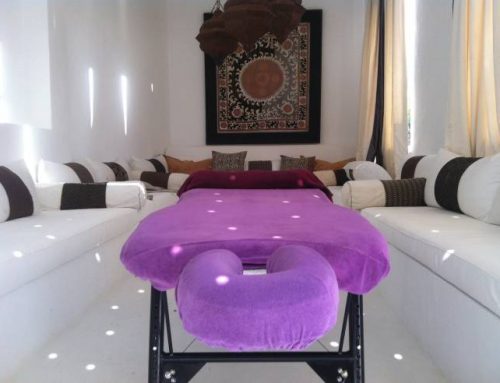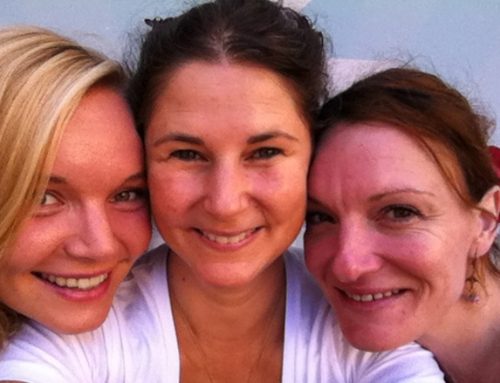In September The Vital Touch were hired to do foot massages at the Sustainable Textile Conference in Barcelona by a company called Prathiba Syntex from India and their creative director Karina Michel and meeting Karin was so inspirering that I decided to inteview her, read her story below……

Karina Michel
1)Karina, tell me who you are and how you ended up at Prathiba Syntex 3 years ago.
I grew up on the out skirts of El Paso, Texas on the border of Mexico, in a trailer park my father built and owned. We moved into the city when I turned 12, about the same time I found my grandmothers old sewing machine. I made and altered a lot of my clothes during high school. When it came time to go to college and choose a degree, I stumbled around for a year until I finally decide to get into fashion and attend the California College of the Arts.
At CCA I had really fantastic professors and came to learn about the deeper implications of fashion and its destructive impact on the environment and societies around the world. It really woke me up and changed me. There was really no way of going back to fashion and the glamorous world that originally beguiled me. I wanted to work in sustainable fashion and somehow be a contributing force for change in the industry.
I graduated with honours but found it intensely difficult to find a job in sustainable fashion. My job applications were repeatedly rejected and I became hopeless. I sought advice from my mentor, Lynda Grose, whom teaches at CCA and she introduced me to Pratibha Syntex, a garment manufacture in India. I’d never heard of them but on that single recommendation I called them up. They said come on over to India and see what you can do here in the factory. I had nothing to lose and with a passion in my belly that had no outlet, so I packed up my things and left for India for a 3 month internship. Three years later and I’m still there, living and working inside the factory.
2)You are now creative director for Prathiba and have started their design department! In 3 years, such an amazing achievement, explain the process.
Just as CCA changed me, so has Pratibha. It was both a huge opportunity to work in the factory as well as a huge challenge to understand intimately the process of making the clothes we wear from fiber to finished garment.
Before I had arrived there was relatively no design department or creativity instilled into any level of the factory. It was a very technical input – output system. However there were internal plans to shift this paradigm. Mr. Shreyaskar Chaudhary, the CEO and visionary of Pratibha wanted to redefine the value of input that manufacturers had on the level of inspiring sustainable change in the industry.
Pratibha has been very progressive in sustainable practices and I feel I have to explain a few of them so that you have a better context. At Pratibha we recycle 95 percent of all water effluence from wet processing by operating two very large effluent treatment plants. We are associated with almost 28,000 Organic (meaning pesticide/chemical free) farmers all around India as apart of our Vasudha program that provides support an education to farmers on organic farming practices. We are able to rainwater harvest nearly all the water needed to operate our green factory so that precious water resources are preserved.
3)Tell me about your recycled collection called ‘Loop’ .
For the past 2 years I’ve been developing a new initiative called LOOP that I was apart of creating since its inception. I named it LOOP, which is aptly derived from closed loop -recycling- systems, or a process of utilizing self generated waste to create a new product. At Pratibha we are able to recycle nearly all the textile waste generated during manufacturing and produce a new product out of it. This has involved years of developing the right fabrics, design, and communication to launch it into the industry and I now regard it as sort of my baby. Im very proud of LOOP! haha!
Along with years of developing LOOP, I’ve had to live inside the factory and away from my family or anything that I’m familiar with. In the beginning it was very difficult to let go of my independence. I live in a rural economic zone in India within a factory compound surrounded by high walls and security. Needless to say it’s not the most charming of lifestyles, but it’s still my home.
4) I know you have turned around collections in a week and had brilliant fashion shows in India,what does fashion mean to you?
The one thing that I really luv about fashion, that I think separates it from all other disciplines, is the indulgence I get to have from not only spending many hours of designing and crafting a piece but also wearing it and cherishing it… or having others cherish your work! It so much more of an intimate relationship between your skin and the fabric of your clothes. You live, breathe, and sleep in it.
Where I think we’ve gone astray as a society is in the lack appreciation we have for our clothes and how it’s made. Today we are completely detached from the process with global outsourcing and production of fashion being done in far away countries. We regard our clothing as a necessary function in day to day life that can be easily bought and thrown away. Because of this our blindness of the industry and this insatiable growing desire for cheaper and more clothes has lead to many unscrupulous practices in the industry that cannot sustain itself with amount of resources involved to produce fashion as well as the well being of those that are associated in producing fashion from the farmers to the workers in the factory.
5)Why did you choose to have foot massages for your stand at the Textile Conference?
Well, at most these textile events you’ll have booths set up and gifts offered to participants, usually a t-shirt or nick knack is given. I wanted to do something far more interesting that left a deeper impression rather than just another t-shirt. What is more impressionable than physical touch? We go around every day in our cocooned lives and personal space. I wanted to break that barrier because If I can break that barrier then more than likely I’ve broken a few other barriers like the ice between meeting someone for the first time. And I’d like to just say that you were absolutely wonderful!!! I’m still receiving thank yours for your foot massages.
6)Last question,I am born in India and have travelled allot there, it’s a magic place for me, how does India feel for you?
Well, I get asked this question a lot about India. For me I think India has been a totally different experience than what most people might expect. It’s not the spiritual or magical India it’s the 9 to 5 job, 6 days a week India. It’s quite a dry experience, but when I can escape my little factory home and venture into the wild thicket beauty of India the experience can sustain me and enrich me to a point that all the dryness washes away. Sometimes it’s never enough though and I cry at night missing my family but I am young and this is a time in my life to be rash and bold, to fear that your decisions may not bear the fruit you hope for, but I’d rather live in fear of the unknown than complacent with familiarity.

Karina Michel

